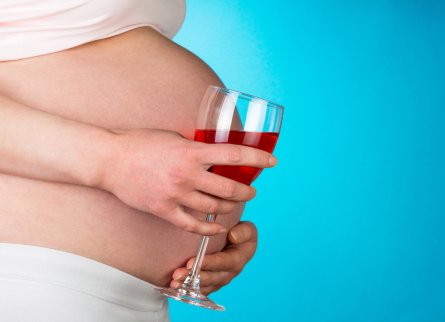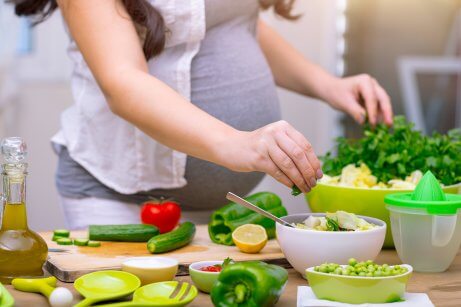Eleven Habits You Should Avoid During Pregnancy

If you’re expecting a baby, you’ll need to modify some habits to look after your health as well as your baby’s. In this article, we present some of the habits you should avoid during pregnancy. Don’t miss it!
Habits to Avoid during Pregnancy
In everyday life, we often carry out endless activities that in some cases aren’t exactly good or healthy. When you’re pregnant, however, it’s important to become aware of these habits to avoid problems.
Surely your doctor has already given you these instructions. However, you should read this article to refresh your memory.
1. Smoking
One of the first tips pregnant women hear is “Quit smoking.” According to the Spanish Association of Pediatrics, smoking during pregnancy can affect the baby’s development.
Among the main problems that tobacco can cause is:
- Low birth rate
- Increased risk of premature delivery
- Increased risk of malformations in the face, extremities, kidney, or heart
- Decreased lung function
- Increased risk of sudden death.
Don’t miss: Five Positive Changes You’ll Notice after You Quit Smoking
2. Drinking Alcohol

Alcohol causes serious damage, triggering a withdrawal syndrome and developmental damage.
Another habit to avoid during pregnancy is drinking alcohol. If you used to go out drinking with your friends, keep in mind that now you must drink water or other non-alcoholic beverages.
The World Health Organization (WHO) warns about the risks of drinking alcohol during pregnancy. This is because alcohol passes directly to the baby through the bloodstream. This substance is highly toxic for babies.
Babies that are repeatedly exposed to alcohol may suffer:
- Fetal alcohol syndrome, which encompasses a series of physical, cognitive, and mental development issues
- Stunted growth and/or developmental delays
- Brain dysfunction
- Facial abnormalities.
3. Eating Raw Fish
Eating sushi or any other dish that includes raw fish during pregnancy may put your unborn baby at risk. Did you know that you can suffer food poisoning or infections caused by the parasites in raw fish?
Consult your doctor and follow their instructions regarding the consumption of raw fish. Becoming seriously ill due to anisakis, for example, could put your pregnancy and your health at risk.
4. Not Drinking Enough Water
Although doctors recommend drinking at least 6-8 glasses of water a day, many times we don’t meet those daily requirements. Suffering dehydration during pregnancy can cause tiredness, cramps, constipation, and heartburn.
However, the consequences for your baby may be more severe:
- Amniotic fluid problems
- Increased risk of premature delivery
- Placental problems, as the placenta is mostly composed of water.
5. Suffering from Long-Term Stress

Modern life leads people to do a thousand things a day. Since sustained stress can harm your child, you should avoid stress during your pregnancy. If you’re stressed, try to relax by doing physical activities such as swimming or yoga for pregnant women.
An investigation concluded that pregnant women who suffer from prolonged periods of stress have an increased risk that their baby will develop physical or mental illnesses, such as attention-deficit/ hyperactivity disorder.
6. Eating Raw Meat and Sausages
The bacteria that cause toxoplasmosis and salmonellosis can be transmitted through the consumption of raw or undercooked meat (not only carpaccio but also ham).
While this disease may not be serious for you, it could cause birth defects in your baby.
7. Eating Raw Eggs
If the eggs you eat aren’t completely cooked, you could contract salmonellosis, an infection that can even cause a miscarriage.
You should also be careful with mayonnaise and other preparations made with raw eggs.
This article may interest you: Can Crying During Pregnancy Affect Your Baby?
8. Consuming Unpasteurized Dairy Products
Another habit to avoid during pregnancy is the consumption of unpasteurized dairy products. This is because unpasteurized milk and dairy products can contain bacteria and, among other conditions, cause listeriosis, a disease that can cause miscarriage or problems in your baby.
9. Eating an Unbalanced Diet

Proper nutrition will keep you from gaining a lot of unhealthy weight, in addition to providing nutrients for the developing embryo.
A diet based on fat and sugar isn’t nutritious. In fact, it wouldn’t be good for you even if you weren’t pregnant! During pregnancy, you should also avoid foods with saturated fats and empty calories to avoid gaining too much weight.
This recommendation goes beyond just looking good. Excessive weight gain is associated with problems such as high blood pressure (and the risk of preeclampsia and gestational diabetes, among other conditions).
10. Drinking Too Much Coffee
While the American College of Obstetricians and Gynecologists states that no link has been found between moderate coffee intake (less than 200 mg daily) and premature delivery and miscarriage, other studies concluded that more than 200 mg may increase the risk.
11. Traveling by Air
Although flying isn’t contraindicated in risk-free pregnancies, you must always consult your doctor before embarking on an adventure! During the first three and the last two months of pregnancy, experts often recommend avoiding flights.
If your pregnancy is risky, you won’t be allowed to fly during gestation to protect your child. Consult your doctor before buying your plane ticket!
Apart from the list we shared in this article, you should ask your doctor what other habits you should avoid during your pregnancy to keep you and your baby healthy. If avoiding these habits or others becomes difficult for you at any given time, remember that you’ll have your baby in your arms in just a few months.
All cited sources were thoroughly reviewed by our team to ensure their quality, reliability, currency, and validity. The bibliography of this article was considered reliable and of academic or scientific accuracy.
- Organización Mundial de la Salud staff. (n.d). El costo que conlleva beber alcohol durante el embarazo. OMS. https://www.who.int/bulletin/volumes/95/5/17-030517/es/
- The American College of Obstetricians and Gynecologists. (2010). Moderate Caffeine Consumption During Pregnancy. https://www.acog.org/Clinical-Guidance-and-Publications/Committee-Opinions/Committee-on-Obstetric-Practice/Moderate-Caffeine-Consumption-During-Pregnancy
- NCBI. (2008). Maternal caffeine consumption during pregnancy and the risk of miscarriage: a prospective cohort study. https://www.ncbi.nlm.nih.gov/pubmed/18221932
- Asociación Española de Pediatría staff. (n.d.). Consumo de tabaco en el embarazo. APED. https://enfamilia.aeped.es/noticias/consumo-tabaco-en-embarazo
- Montoya Salas, K. (2011). Síndrome alcohólico fetal. Medicina Legal de Costa Rica, 28(2), 51-55. https://www.scielo.sa.cr/scielo.php?pid=S1409-00152011000200006&script=sci_arttext
- Figueroa-Damián, R., Beltrán-Montoya, J., Espino, S., Reyes, E., & Segura-Cervantes, E. (2013). Consumo de agua en el embarazo y la lactancia. Acta Pediátrica de México, 34(2), 102-108. https://www.medigraphic.com/pdfs/actpedmex/apm-2013/apm132k.pdf
- Pinto-Dussán, M. C., Aguilar-Mejía, O. M., & Gómez-Rojas, J. D. (2010). Estrés psicológico materno como posible factor de riesgo prenatal para el desarrollo de dificultades cognoscitivas: caracterización neuropsicológica de una muestra colombiana. Universitas Psychologica, 9(3), 749-759. https://www.redalyc.org/pdf/647/64716836011.pdf
This text is provided for informational purposes only and does not replace consultation with a professional. If in doubt, consult your specialist.








